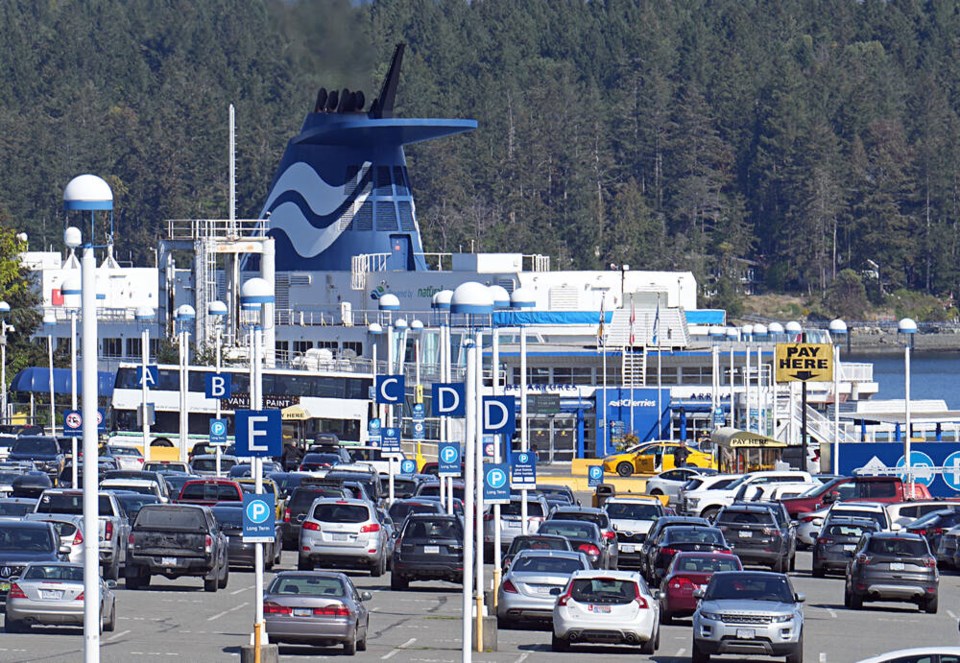The four major vessels B.C. Ferries hopes to have built and in service by 2029 will not be built in Canada.
No Canadian shipyards submitted proposals to build the vessels, Ed Hooper, B.C. Ferries’ executive director of shipbuilding, said in a statement. Because the project is still in the procurement stage, the company cannot speak in detail about which yards submitted bids, as it could compromise the competitive process, he said.
While no Canadian shipyards submitted bids, B.C. Ferries has had good dialogue with a number of them and there may yet be opportunities for them to contribute to the project, Hooper said. “The local industry has always played a critical role in maintaining our fleet, and that will continue.”
Hooper said B.C. Ferries remains confident the corporation will find a highly qualified partner to build the four vessels.
“Our focus is on selecting a builder with a strong track record — one that can deliver safe, reliable, and high-quality vessels while offering long-term value,” he said. “While affordability is an important factor, it’s part of a broader evaluation that prioritizes safety, performance, and the ability to meet the needs of ferry users and coastal communities well into the future.”
B.C. Ferries hopes to award the vessel construction contracts by June.
Opting to have the next series of vessels built overseas is nothing new for B.C. Ferries, which had four Island-class electric vessels built in Romania and Salish-class vessels built in Poland.
The three Coastal-class vessels — Inspiration, Renaissance and Celebration — were built in Germany in 2007 and 2008. The total cost of constructing those ferries surpassed $500 million.
Seaspan, which owns the province’s largest shipyards, did not immediately respond to a request for comment on Tuesday, but in the past it has said it would have liked to bid on building B.C. Ferries’ major vessels.
In a letter to Office of the B.C. Ferries Commissioner in support of the major vessel program, David Hargreaves, Seaspan’s senior vice-president of strategy, said the shipyard does not have the capacity to build all of the vessels in the timeframe required by B.C. Ferries.
“As such, we support procurement of those vessels from a non-B.C. shipyard,” he said. “We believe that there is a great opportunity for the province of B.C. to show leadership by developing a strategy by which future B.C. Ferries vessels could be built in B.C. and therefore provide much larger strategic and economic benefits to the province.”
The shipbuilder, which operates Vancouver Shipyards and Vancouver Drydock in North Vancouver and Victoria Shipyards in Esquimalt, has said in the past that getting in on the process is impossible until the province provides incentives.
In a statement last fall, Seaspan noted it can’t compete with its counterparts in Quebec, where the company says the province supports its shipyards by requiring vessels to be built domestically and providing tax credits, forgivable loans and grants surpassing $1 billion.
The B.C.-based shipyard also noted it can’t compete with low-wage countries that have less-stringent employment, environmental and safety standards.
Details of the costs of B.C. Ferries’ major vessel program have not been released. The Office of the B.C. Ferries Commissioner, which signed off on the four-vessel request two weeks ago, said that number would not be revealed until the project was complete.
However, in 2018, when B.C. Ferries initially announced plans to order five major vessels, the cost was estimated at between $700 million and $1 billion. That building project was sidelined by the pandemic.
The last time a B.C. shipyard turned out major vessels for B.C. Ferries was when Spirit of British Columbia and Spirit of Vancouver Island were built in 1993 and 1994 by Allied Shipyards in North Vancouver and Integrated Ferry of Esquimalt.
>>> To comment on this article, write a letter to the editor: [email protected]



